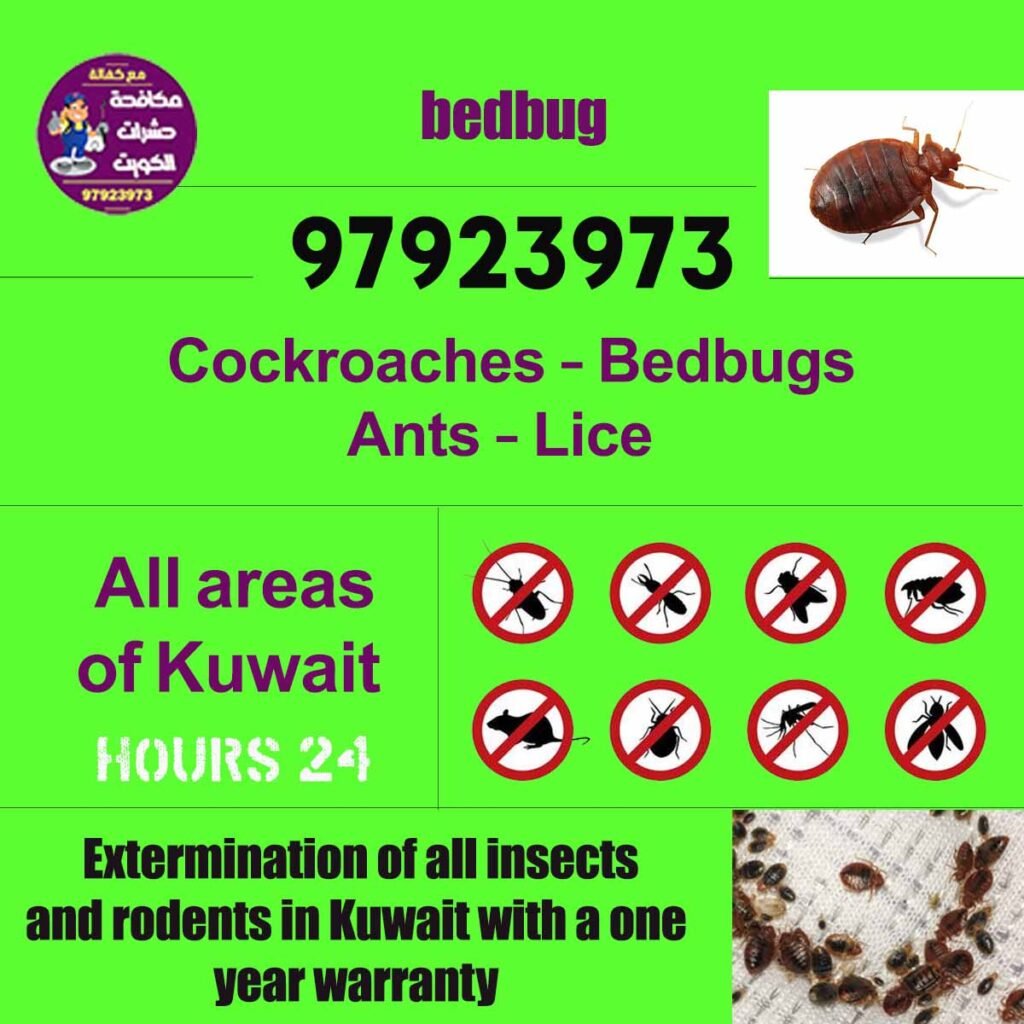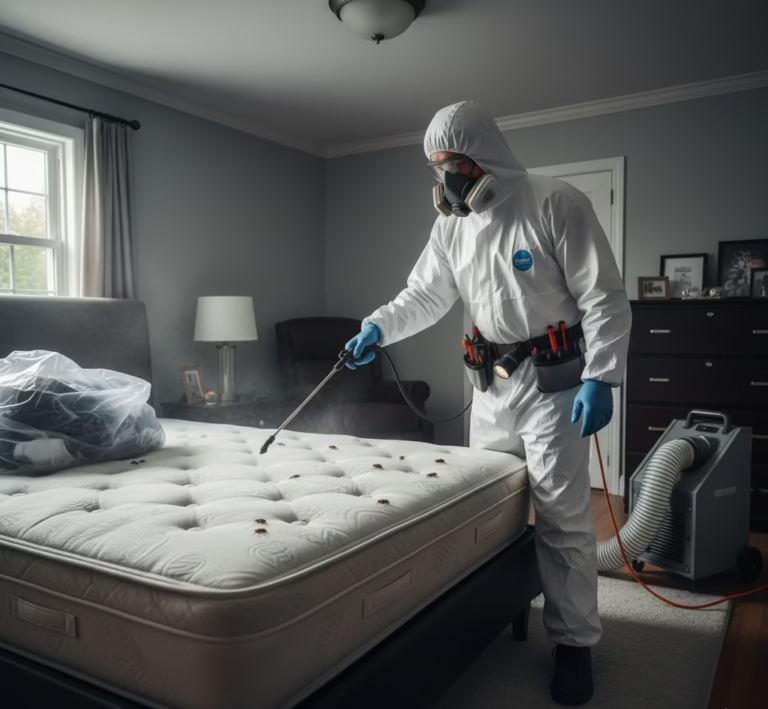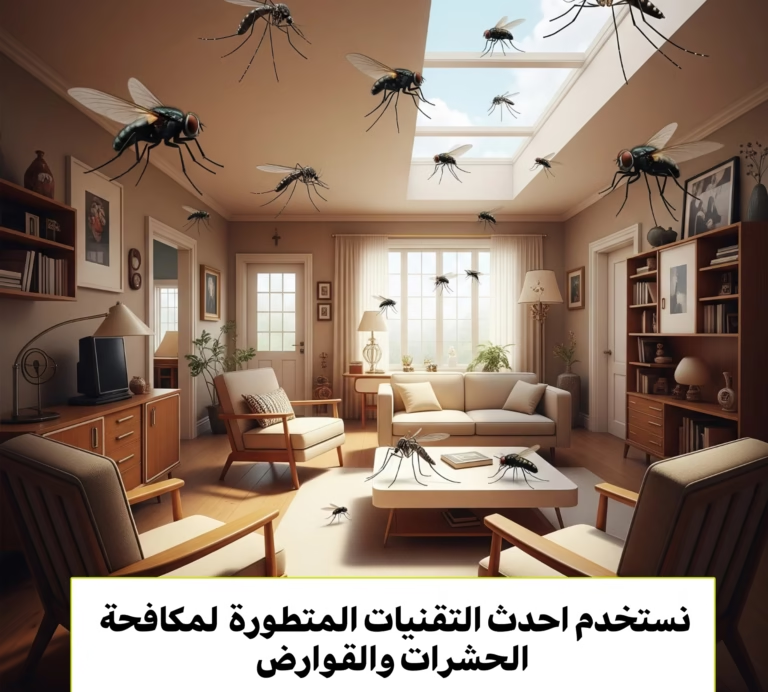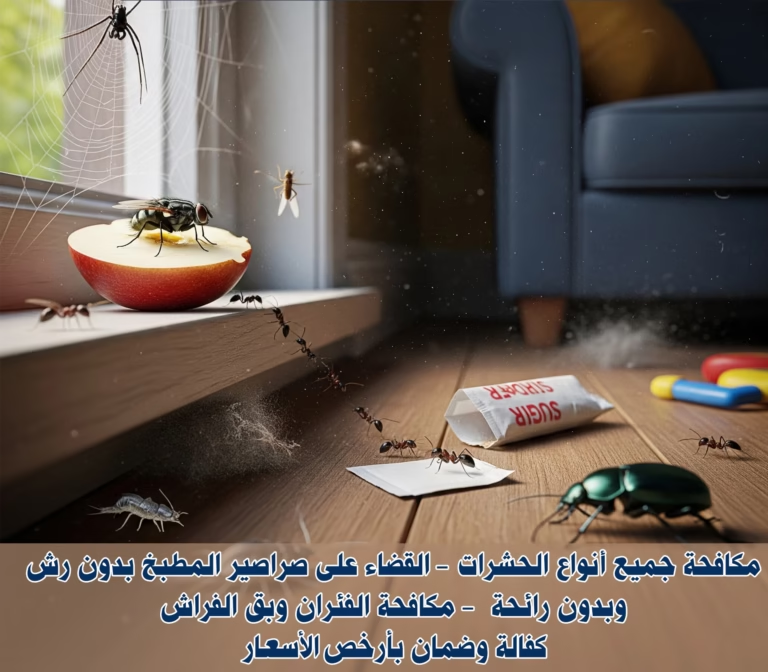Understanding Bed Bugs Kuwait
Bed bugs, scientifically known as Cimex lectularius, are small, wingless insects that. belong to the Cimicidae family. Adults typically measure between. 4 to 5 millimeters in length and have a flat, oval-shaped body that allows them to hide in various crevices. These pests are primarily nocturnal, preferring to feed on the blood of warm-blooded hosts, including humans. Their life cycle consists of several stages: egg, nymph, and adult, with a single female capable.
of laying hundreds of eggs in her lifetime. Under optimal conditions, bed bugs can develop from eggs. to adults in as little as 5 weeks, facilitating rapid infests.
in both residential and commercial properties.
Bed bugs are adept at remaining hidden, often residing within mattresses, bed frames, and other furniture. They can also be found in electrical outlets, behind wallpaper, and in any small crack or crevice nearby sleeping areas. This ability to slip into hard-to-reach spaces makes detection and eradication particularly challenging. Common signs of an infestation include dark spots (bed bug excrement) on sheets,. red itchy welts on the skin,.
and the presence of shed exoskeletons. Awareness of these indicators is critical, as early detection significantly increases the likelihood of effective control measures.
In Kuwait, the warm climate can.
contribute to the prevalence of bed bugs, as high temperatures and humidity levels can create conducive.
conditions for their survival and reproduction. Additionally, increased travel to and from the region may facilitate the introduction of bed bugs into new environments. Therefore, it is essential for property owners and occupants in Kuwait.
to remain vigilant. and implement preventive measures,.
particularly in places like hotels and public transportation, where infestations are more likely to occur.
Identifying Bed Bug Infestations
Bed bugs are notorious for their elusive nature Kuwait, . Contact us 97923973 making the identification of an infestation crucial for effective pest control. One of the primary signs of bed bug presence is the appearance of bites on the skin, often in a.
line or cluster, typically occurring on exposed areas during sleep. These bites can cause itching and discomfort, prompting vigilance in identifying the source.
Physical evidence of an infestation is often found in the form.
of dark spots on bedding, which may be fecal matter left behind by the bugs. These spots can appear as small brown or black dots. Additionally, shed exoskeletons and even the bugs themselves can sometimes be discovered in and around sleeping areas. Adult bed bugs are small,
about the size of an apple seed, and have a flat, oval shape, often hiding in seams.
, crevices, and folds of mattresses, box springs, and upholstered furniture.
To effectively inspect your living space for these pests, it is advisable to begin with the mattress and box spring. Check for any signs of bed bugs, including live insects and their remnants. Bed frames and headboards should also be thoroughly examined, as these areas often serve as hiding places. Don’t overlook other furniture items, such as chairs and sofas, as bed bugs can spread into various types of household items.
In the context of Kuwait, unique challenges arise due to the climate and housing structure. High population density and transient living arrangements often allow for increased bed bug exposure. If signs of bed bugs are observed during your inspections, it may be prudent to seek professional help, especially if efforts to eliminate them on your own have been unsuccessful. Prompt action is vital to preventing a widespread infestation.
Preventive Measures Against Bed Bugs
Effective bed bug control begins with prevention. To minimize the risk of infestations, homeowners and travelers in Kuwait can adopt several proactive strategies. One significant step is to thoroughly inspect second-hand furniture before bringing it into the home. Bed bugs are often found in used items, such as mattresses, couches, and chairs. It is essential to check seams, folds, and hidden compartments for signs of bed bugs, such as eggs, shed skins, or live insects.
For those who frequently travel, there are additional precautions to take. When checking into hotels or guesthouses, it is advisable to conduct a visual inspection of the bedding and furniture. Keeping luggage elevated and away from the bed can help prevent bed bugs from hitching a ride back home. Utilizing protective covers for mattresses and box springs can offer additional layers of defense, as these barriers detain bed bugs and reduce the chance of an infestation.
Safe laundering practices play a crucial role in prevention. Washing clothing and bedding at high temperatures can effectively eliminate potential insects. For items that cannot be washed, placing them in a dryer on high heat for at least 30 minutes is beneficial. This method helps to ensure that any hidden bed bugs are killed before they have a chance to reproduce.
Community awareness efforts also play an indispensable role in combating bed bugs in Kuwait. Public health campaigns aim to educate residents about identifying and preventing infestations. Collaborating with local authorities, these initiatives reinforce the importance of vigilance and proactive measures. By staying informed and actively participating in community efforts, individuals can contribute to a collective response against bed bugs and reduce the prevalence of these pests in their surroundings.
DIY Bed Bug Control Methods

Bed bug infestations can be challenging to manage, but various do-it-yourself (DIY) methods offer viable solutions for Kuwait residents. One of the most effective approaches involves applying heat treatments. Bed bugs cannot survive temperatures exceeding 120°F (49°C). Homeowners can utilize heat by placing infested items in a dryer on high heat for at least 30 minutes. This method is particularly beneficial for clothing, bedding, and other fabric items, ensuring that pests are eliminated without the use of chemicals, which may be of concern for some households.
Vacuuming is another essential DIY technique in combating bed bugs. Regularly vacuuming areas where bed bugs are likely to hide, such as mattresses, box springs, and bed frames, can help remove both adult bugs and their eggs. It is important to empty the vacuum cleaner immediately after use, sealing the contents in a plastic bag before disposal, to prevent any surviving bed bugs from re-entering the living space.
Steam cleaning
can also serve as a potent method of bed bug control. The high temperature of steam can penetrate fabric and kill bed bugs on contact. This method is most effective on surfaces like carpets, upholstery, and curtains. However, it’s vital for users to follow the manufacturer’s instructions for the steam cleaner to ensure optimal effectiveness and safety.
For those who prefer natural remedies, certain essential oils, such as tea tree oil and lavender oil, have been reported to repel bed bugs. While these options may offer a level of deterrent, their efficacy in eliminating an infestation varies and should be viewed as supplementary methods rather than standalone solutions.
In terms of practicality, these DIY methods can be effective for Kuwaiti households, particularly when executed with diligence and care. However, it is advisable to monitor the results closely. Should the problem persist, seeking professional pest control services may be necessary to fully resolve the issue.
Chemical Treatments for Bed Bugs
Chemical treatments remain a prevalent method for controlling bed bug populations in various regions, including Kuwait. These treatments utilize specific pesticides that target the adult bed bugs, nymphs, and their eggs. The most commonly used categories of pesticides include pyrethroids, which are synthetic chemicals resembling natural pyrethrins, and neonicotinoids, which act on the nervous system of the pests. One notable aspect of these chemicals is their ability to disrupt the life cycle of bed bugs, thereby preventing future infestations.
When selecting a pesticide for bed bug treatment, it is crucial to note that not all products are equally effective. Pesticides should be registered with relevant local authorities, ensuring that they meet safety and efficacy standards. In Kuwait, professionals often recommend particular pesticides such as deltamethrin and imidacloprid for their effectiveness against bed bugs. These products should be applied as per the manufacturer’s instructions, ensuring that dosages meet safety regulations and intended effects.
Safety precautions are vital when applying chemical treatments. Homeowners and pest control professionals are advised to wear protective gear, including gloves and masks, to minimize exposure to toxic substances. It is essential to ventilate the treated area adequately after application, keeping children and pets away until the space is deemed safe. Furthermore, efforts should be made to follow an integrated pest management approach, where chemical treatments are combined with non-chemical methods for maximum efficacy.
While do-it-yourself options are available, professional pest control services are recommended, especially for severe infestations. These experts possess the training, experience, and access to specialized products that can ensure thorough and safe treatment. Engaging professionals can lead to a more comprehensive eradication of bed bugs, significantly reducing the chances of future outbreaks. Utilizing chemical treatments effectively can be a key component in the battle against bed bugs in Kuwait.
Professional Bed Bug Extermination Services
Bed bug infestations are a challenging issue that many residents in Kuwait encounter. When faced with these persistent pests, it is often advisable to seek the expertise of professional pest control services. Engaging professionals can facilitate the effective and thorough eradication of bed bugs, providing long-term solutions instead of temporary fixes. Early intervention is crucial, as bed bugs can reproduce rapidly, leading to more significant infestations that are harder to manage without professional help.
One of the primary benefits of hiring a pest control service is their access to advanced extermination techniques and tools. Professionals are trained to identify the full extent of an infestation, including hidden breeding sites that an untrained individual may overlook. Moreover, many pest control experts use environmentally friendly products that ensure the safety of residents and pets while effectively targeting bed bugs. This approach not only resolves the immediate problem but also prevents future infestations, making it a wiser long-term investment.
During the treatment process, homeowners can expect a comprehensive inspection, followed by customized extermination efforts tailored to the specifics of the infestation. Treatments may include heat applications, chemical treatments, and follow-up visits to confirm the bed bugs have been eradicated. It is essential for residents to communicate openly with the exterminators, sharing any previous attempts or locations of sightings, as this information can aid in the effectiveness of the treatment plan.
When selecting a reputable pest control service in Kuwait, it is critical to check credentials, reviews, and methodologies. Consulting with past clients and verifying licenses can help residents make informed choices. By enlisting the help of qualified exterminators, individuals can reclaim their homes from bed bugs with confidence and peace of mind.
Post-Treatment Monitoring and Maintenance
Following the successful treatment of bed bug infestations, the importance of thorough monitoring and maintenance cannot be overstated. Ensuring that the measures taken to eliminate these pests remain effective requires vigilance and proactive management. Regular follow-up inspections are crucial in identifying any potential resurgence of bed bugs, as even the most well-executed treatment plans may not completely eradicate the problem if left unchecked.
When conducting follow-up inspections, it is advisable to check areas where bed bugs are commonly found, such as along mattress seams, inside box springs, and within furniture crevices. Inspecting the surrounding environment, including baseboards, carpets, and any nearby clutter, will help identify areas where bed bugs may be hiding. Utilizing tools such as a flashlight and magnifying glass can enhance detection efforts, particularly in hard-to-see areas.
Maintaining cleanliness is paramount for preventing re-infestations. Regular vacuuming of home environments, particularly in areas that may harbor bed bugs, can significantly reduce the likelihood of their return. It is essential to ensure that vacuum bags are disposed of appropriately, as bed bugs can survive for an extended period in those waste materials. Furthermore, washing bedding, curtains, and clothing in hot water followed by drying on a high heat setting will eliminate any stowaway pests.
Beyond immediate cleanliness practices, adopting ongoing preventative measures is vital in the quest for a bed bug-free zone. Encasements for mattresses and box springs serve as an effective barrier against these pests, preventing their entry and making it easier to spot any potential issues. Regularly inspecting these encasements and maintaining proper storage practices for clothing and linens can aid in early detection. By fostering an environment that prioritizes cleanliness and vigilance, homeowners can significantly reduce the risk of future bed bug infestations.
Bed Bug Myths Debunked
Bed bugs, scientifically known as Cimex lectularius, have been the subject of numerous myths and misconceptions that can impede effective pest management. One prevalent myth is that bed bugs are a sign of uncleanliness or poor hygiene. In reality, these pests can infest any environment, regardless of cleanliness. Bed bugs are highly adaptable and can thrive in both pristine and cluttered spaces. They are primarily attracted to the warmth and carbon dioxide emitted by humans, which means that even the most well-maintained homes can be susceptible to infestation.
Another common belief is that bed bugs can be effectively eradicated using home remedies. While some DIY methods may provide temporary relief, they often fail to eliminate bed bugs completely. For instance, while some individuals may advocate for the use of essential oils or vinegar as natural repellents, research indicates that such home remedies are rarely successful in eradicating bed bug populations. A comprehensive and systematic approach, typically involving professional-grade insecticides and treatment protocols, is essential for effective bed bug control.
Additionally, many people think that bed bugs can fly or jump, which is untrue. They are wingless and rely on crawling to reach their hosts. This misconception can lead to an underestimation of their ability to spread, as they can hitch a ride on clothing, luggage, or furniture, thereby infesting new areas. Understanding that bed bugs do not have wings but can travel efficiently through human movement is vital in recognizing their potential to spread rapidly.
Lastly, it is crucial to note that bed bugs are not known to transmit diseases to humans, although their presence can lead to significant discomfort and anxiety. Addressing these myths and misconceptions about bed bugs can help individuals take appropriate measures for effective pest control and prevention.
Resources and Support for Bed Bug Issues in
Bed bug control 97923973
— مكافحة حشرات الكويت (@QMedia287196) March 23, 2025
Bed bug control in Kuwait with the best pesticides. We carry out a complete spraying process for the entire house in a professional manner.#Bed_bug_control#Bed #bug #controlhttps://t.co/xXcVC6fNNJ pic.twitter.com/WswTnU4r4h
Residents of Kuwait facing bed bug infestations can leverage a variety of resources for effective control and management. Local pest control companies play a crucial role in addressing these issues, providing professional services equipped with the latest treatments. Some established pest control firms in Kuwait include “Kuwait Pest Control,” “Al-Faisal Pest Control,” and “Kuwait Exterminators.” These companies offer specialized services targeting bed bugs, ensuring comprehensive solutions tailored to individual needs.
In addition
to private pest control services, government health resources can provide valuable information on bed bug prevention and control. The Ministry of Health in Kuwait frequently publishes guidelines and articles pertaining to public health, including pest management strategies. Engaging with these resources can help residents understand the importance of early detection and the health considerations associated with infestations.
Community support groups and online platforms also offer avenues for residents to share experiences and seek advice. Social media groups focusing on pest control in Kuwait allow individuals to exchange tips and recommend services based on personal experiences. Platforms such as Facebook or local forums may host active discussions centering around pest control challenges, including those related to bed bugs.
For more in-depth information about bed bugs and their management, numerous online educational materials are available. Websites like the Centers for Disease Control and Prevention (CDC) and the Environmental Protection Agency (EPA) provide comprehensive guides and research on pests. These resources emphasize preventive measures, identification techniques, and safe handling practices when dealing with infestations.
Ultimately, a combination of professional services, government resources, community engagement, and educational materials can empower residents in Kuwait to effectively combat bed bug issues, ensuring their homes remain pest-free.






